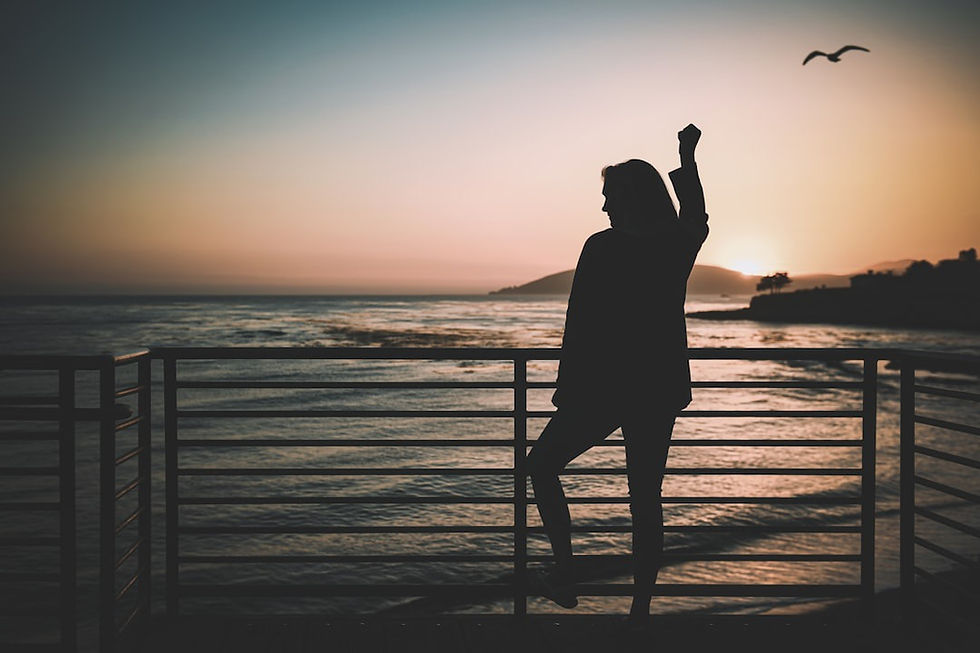Why I Didn't Fast for Yom Kippur This Year
- Nasiyah Isra-Ul

- Oct 12, 2025
- 4 min read
This year was my first year observing Yom Kippur with a synagogue since reconnecting with my Judaism and trying to become more observant. Last year, I didn't know about my disabilities or the specifics of the mitzvah to eat or not eat on Yom Kippur, so I managed to do a semi-fast from food but not water at home for most of the day. This year, I could not fast because of my disabilities, and specific medical instructions from my doctors meant to keep me from the ER. It was a big disappointment for me, considering I am a big stickler for "doing it right" and experiencing new things. But even though I was not fasting this year, I educated myself on the holy day, and attended the Kol Nidre service and three hours of the main service. In doing so, I gained new admiration for the holy day and the people who actually fast from food and water for the entire 25-hour period.
Primarily, I did a deep dive into pekuach nefesh (preserving life) and innui nefesh (afflicting one's soul), and how they can connect, overlap, and work in tandem with each other. Here's what I found.
Pekuach Nefesh and Living by Torah
The rabbis were very clear throughout a significant portion of halachic rulings and Torah commentary that people were supposed to "live by the Torah, not die by it." They created the concept called Pekuach Nefesh, which roughly translates to "saving a soul." The idea was that if doing a mitzvah was going to cause harm, it was appropriate (perhaps even necessary) not to fulfill that mitzvah and prioritize preserving the individual's life instead. Apparently, it's actually a mitzvah to prioritize life over another mitzvah.
This principle in Judaism speaks to me as both a disability advocate and as someone who has had the Bible weaponized against me in the past because of my limitations. No one should ever be shamed because they cannot fulfill a mitzvah due to physical limitations, and it is never worth it to hurt oneself to try. Hearing my rabbi bring this up in synagogue on Yom Kippur was even more empowering. She encouraged people to eat and drink if needed and encouraged the entire congregation to keep in mind that not everyone would be fasting.
I have dysautonomia, which is a condition that affects the autonomic nervous system. Going without protein, water, and electrolytes for an extended period of time will be a sure-fire way to faint or trigger whole-body tremors that could last hours. Fasting would not allow me to live by the Torah and would instead cause harm to myself, which would be the opposite of what the mitzvah was intended for. It would be a misappropriation of my observance and a misuse of the holy day.
Alternative Forms of Innui Nefesh
All month long, as I prepared for Yom Kippur during the month of Elul, I tried to figure out other ways to still honor the holy day. I was saddened that I would not be able to fast, and struggled with thoughts of inadequacy and imperfection. But the goal of Yom Kippur is to be vulnerable with God and repair the relationship between Him and us, and if one cannot fast from food, the same idea can apply to other things we may find important.
So, I decided to spend the evening of Yom Kippur in prayer during the Kol Nidre service, which was absolutely amazing. I wore all white, as is the custom, and stayed off my digital devices for most of the night to honor the sanctity of the evening. I loved referencing A Mitzvah to Eat's website for resources and tips.
The next morning, I started my abstinence from "delightful" foods, things that primarily brought pleasure instead of simply being life-sustaining. I had just bought a gluten-free pumpkin pie and non-dairy heavy whip a few days prior (my childhood favorite during the fall), and I had to pass it up for almost 25 hours in honor of Yom Kippur. I didn't eat anything except salted snacks, protein, and other basic foods in small portions. I also abstained from television, YouTube, social media engagement, and digital games (including my favorite, Minecraft). I spent my time attending services at synagogue for a few hours, then watching services at home afterward, as well as journaling and reflecting on my past year.
Conclusion
Even in not being able to fast, I managed to do other things that reminded me of the purpose of the day and allowed me to still participate in the intentions behind it. I was also able to engage with the community, get to know more people at my synagogue, and take a much-needed break from the hectic world I work in to refocus on God. This year's Yom Kippur taught me a valuable lesson about the importance of doing what you can for God, even if it doesn't seem like a lot to you. I put my best foot forward for Yom Kippur, and I received a powerful, heart-cleansing, and eye-opening experience in exchange. It was never about pushing myself beyond my limits to show God I care; it was about honoring God by honoring the body He gave me, and recognizing that on Yom Kippur, it is all given back to God as I renew my relationship with Him and pray for the repair of the world at large.
.png)



Comments